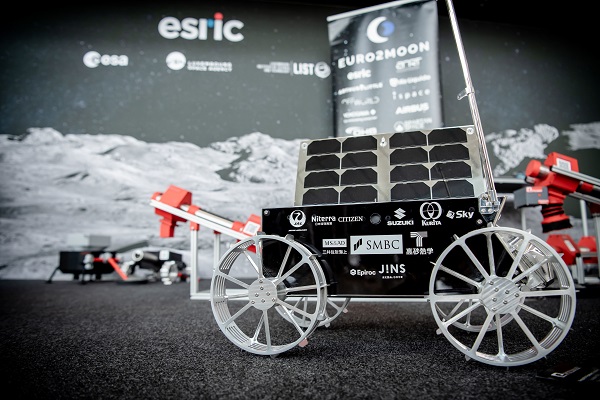 iSpace rover on display during Space Resources Week 2025;
Credit: ESRIC
iSpace rover on display during Space Resources Week 2025;
Credit: ESRIC
The Luxembourg-based European Space Resources Innovation Centre (ESRIC) is celebrating its fifth anniversary, marking five years since its launch as the world's first innovation centre dedicated to space resources.
As reported in a press release, ESRIC's mission is to enable sustainable space exploration and lay the foundations for a future in-space economy.
Founded in 2020 by the Luxembourg Space Agency (LSA) and the Luxembourg Institute of Science and Technology (LIST), with the European Space Agency (ESA) as strategic partner, ESRIC has become a key part of Luxembourg's long-term strategy to develop its space sector, according to the government and project partners.
Driven by the SpaceResources.lu initiative and backed by a general agreement signed last year between the Luxembourg government and LIST, ESRIC was created to establish a strategic national capability that supports space exploration, fuels economic diversification and positions Luxembourg at the heart of Europe's future in-space economy.
Based within LIST, ESRIC has grown to a team of 30 people leading activities across three core pillars: research, commercialisation and community. ESRIC's research programme, including funding from the Luxembourg National Research Fund (FNR) to the ESRIC director under the PEARL programme, focuses on the sustainable and responsible use of space resources and the team is developing tools, technologies and knowledge that will enable the use of resources such as oxygen, metals and water on the Moon.
ESRIC supports startups and early-stage ventures in this sector with its incubator and accelerator programmes, in partnership with Technoport and ESA. Collaborating with a network of national and international experts, ESRIC has so far supported 32 companies through these programmes, with six relocating to Luxembourg as a direct result of their participation.
In addition, ESRIC brings people together through the annual Space Resources Week conference. The 2025 edition, held in May, welcomed over 450 participants to Luxembourg from around the world, including delegates from space agencies, industry, startups, academia and research institutes, and other organisations.
"As ESRIC turns five, we can be incredibly proud of what we've achieved as a team, together with the support of LSA, LIST and ESA," said Kathryn Hadler, Director of ESRIC. "Space resources is an exciting and challenging domain that could transform space exploration and provide tangible benefits for Earth. This anniversary is a moment to celebrate the collaborations and support that have made ESRIC's achievements possible and to look forward to the next five years of continued growth."
Looking ahead, ESRIC is expanding its facilities in Luxembourg, including the upcoming Dusty Thermal Vacuum Chamber developed with ESA funding, which will allow the community to test technologies under conditions similar to those on the Moon. The centre also plans to continue advancing research, supporting entrepreneurs and fostering international collaboration.
As strategic partner, ESA contributes to the establishment, operations and utilisation of ESRIC through its Terrae Novae exploration programme. Providing funds, equipment and technical contributions, ESA works in close coordination with the teams to support the development of the national space ecosystem.








